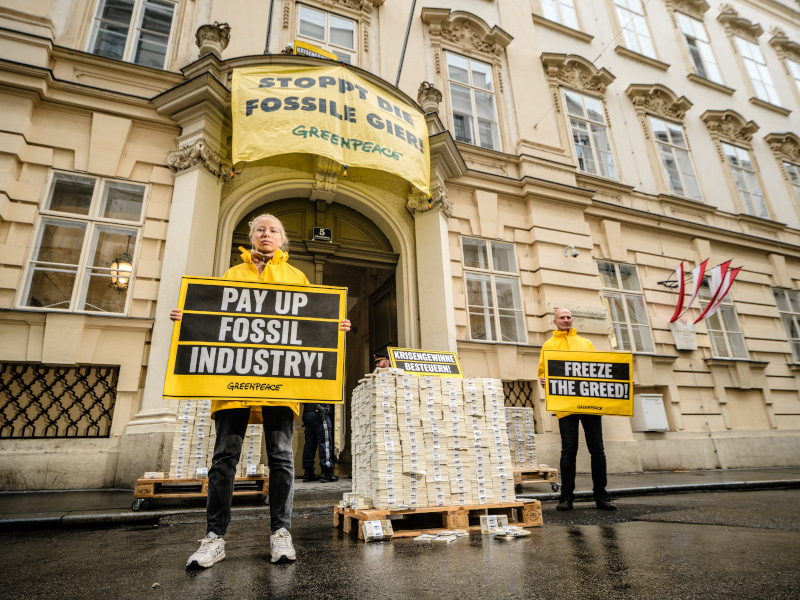
Brussels, 30 September 2022 – EU energy ministers meeting in Brussels today look set to slow down the roll-out of taxes on energy firms’ excess profits, despite the urgency of more immediate action before winter sets in.
A 29 September draft plan obtained by Contexte suggests that governments will collect windfall taxes on 2022 profits “and/or” on 2023 profits, creating a loophole which will leave low-income households exposed, as people struggle to power and heat their homes throughout this winter’s cost of living crisis.
Greenpeace EU campaigner Thomas Gelin said: “Energy companies destroying the planet have been making silly amounts of money since the war began, at the expense of ordinary people around Europe. The EU and governments must tax all of these windfall profits now, not next year. This money is urgently needed to protect the most vulnerable people this winter, and to pay for renewables and energy-saving measures, like ramping up public transport and home insulation, which can help avoid crises like this in the future.”
Ministers are also set to significantly lower energy firms’ overall windfall tax bill by adding the year 2018 to the baseline reference period used to calculate companies’ excess profits. The EU Commission proposed a three-year baseline of 2019-2021, but governments want to extend this to cover 2018 as well. Since the revenue of fossil fuel companies was lower in 2020 due to lockdowns, the effect of adding 2018 to the baseline would be to make oil, coal and fossil gas profits in 2022 appear less excessive by comparison, which will ultimately mean less money available for people who need support.
The plans also look set to create potential loopholes that allow governments to favour their national industries. The EU Commission had initially proposed a single “inframarginal price cap” of €180 per megawatt hour of electricity, but governments want to be able to set different caps for different types of electricity producers, creating the risk of discrimination.
Nord Stream
Ministers are also discussing the massive leaks from the Nord Stream pipelines in the Baltic Sea, which Greenpeace calculates could emit the equivalent of 43.8 million tonnes of carbon dioxide over a twenty year period based on Danish Energy Agency figures, and a controversial plan to cap the price of fossil gas.
Next steps
If governments reach a political agreement on the plan to address high energy prices today, they will ask the EU Commission to reflect their agreement in a final draft Council regulation, which they will then adopt. Given the urgency of the situation this could happen relatively quickly.
Individual governments will still be able to introduce stronger measures than those in the Council regulation.
Greenpeace is calling for a 100% windfall tax on energy companies’ profits from 2022 to urgently finance support for vulnerable households as well as investments in renewables and energy savings measures.
Contacts:
Thomas Gelin, Greenpeace EU campaigner, + 32 (0)473 570446 [email protected]
Greenpeace EU press desk: +32 (0)2 274 1911, [email protected]
For breaking news and comment on EU affairs: www.twitter.com/GreenpeaceEU
